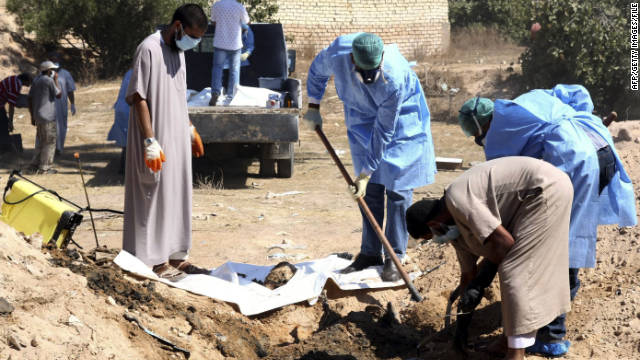
The suspected grave holds 1,270 bodies, according to Libya's National Transitional Council. It was located by revolutionaries on August 20, said Kamal el Sherif, a member of an NTC committee.
"There is a lot more to be done to reach the actual truth of this massacre," said Dr. Salem Fergani, also a committee member. "To be honest, we were not prepared to deal with such human massacres, so we request the assistance of the international community. We need specialists in the field to help us in identifying the victims ... this is a national mission. The families of these victims have the right to learn the truth about their deceased sons."
Former guards at the prison cooperated in helping find the grave and provide details of the massacre, said Abdul Wahab Gady. He said he is a former prisoner who was at Abu Salim when the deaths took place.
The bones are scattered around an area with about a 100-meter radius, Fergani said. Members of the media were taken to the site on Sunday and shown bones and clothing. Family members of the Abu Salim victims also turned up at the site.
On June 28, 1996, prisoners rioting over poor conditions and restricted family visits seized a guard and escaped from their cells.
"Five or seven minutes after it started, the guards on the roofs shot at the prisoners who were in the open areas," former prisoner Hussein Shafei told Human Rights Watch in an interview years later.
Security officials ordered the shooting to stop and feigned negotiations, he told the organization. But officials instead called in firing squads to gun down the prisoners.
After the inmates agreed to return to their cells, they were taken to prison outdoor areas, blindfolded, handcuffed, and shot.
At first, said Gady, the bodies were buried inside the prison walls, but moved outside the walls in 1999.
The government of ousted Libyan leader Moammar Gadhafi did not acknowledge the killings and denied any crime had taken place. Some families filed a complaint against the government in 2007, Human Rights Watch said, and Gadhafi's government offered them compensation in exchange for their silence.
The families refused, calling it a bribe, and instead began holding protests each Saturday in Benghazi, one of the spots where the Libyan unrest began this year.
It could take years to identify all the bodies through DNA, Fergani said Sunday.
No comments:
Post a Comment